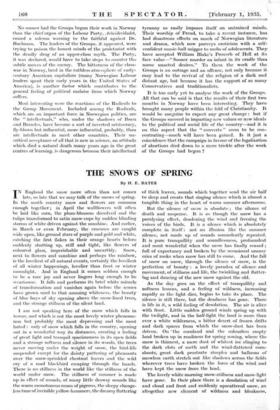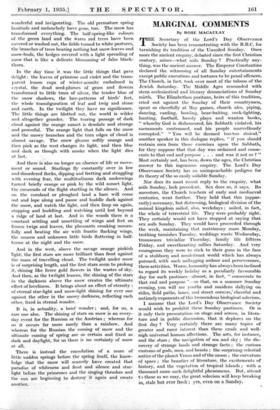THE SNOWS OF SPRING
By H. E. BATES
IN England the snow more often than not comes late, so late that we may talk of the snows of spring. In the south country snow and flowers are common enough together ; in April the wallflowers will often be laid like corn, the plum-blossom dissolved and the tulips transformed to satin snow-cups by sudden blinding storms of white driven against the sunshine. And earlier, in March or even February, the crocuses are caught wide open, like ground stars of purple and gold and white, catching the first flakes in their orange hearts before suddenly shutting up, stiff and tight, like flowers of coloured glass, imperishable and unearthly. Snow, next to flowers and sunshine and perhaps the rainbow, is the loveliest of all natural events, certainly the loveliest of all winter happenings, lovelier than frost or winter moonlight. And in England it comes seldom enough to be a rare joy and never lingers long enough to be wearisome. It falls and performs its brief white miracle .of transformation and vanishes again before the senses have grown used to that amazing whiteness, the beauty of blue bays of sky opening .above the snow-lined trees, and the strange stillness of the silent land.
I am not speaking here of- the snow which falls in towns, and which is not the most lovely winter phenome- non but probably the most depressing and the most hated : only of snow which falls in the country, opening out in a wonderful way its distances, creating a feeling of great light and tranquil spaciousness in its open fields and a strange softness and silence in its woods, the trees never moving under the weight of snow, the bird-life suspended except for the dainty pattering of pheasants Over the snow-sprinkled chestnut leaves and the wild cry of a mad blackbird escaping through the hazels. There is no stillness in the world like the stillness of the world under snow. The stillness of summer is made up.in effect of sounds, of many little drowsy sounds like the warm monotonous moan of pigeons, the sleepy change- less tune of invisible yellow-hammers, the dreamy fluttering of thick leaves, sounds which together send the air half to sleep and create that singing silence which is almost a tangible thing in the heart of warm summer afternoons.
But the silence of snow is absolute ; the silence of death and suspense. It is as though the snow has a paralysing effect, deadening the wind and freezing the voices of the birds. It is a silence which is absolutely complete in itself : not an illusion like the summer silence, not made up of sounds somnolently repeated. It is pure tranquillity and soundlessness, profoundest and most wonderful when the snow has finally ceased ; full of expectancy and broken by the occasional uneasy cries of rooks when snow has still to come. And the fall of snow on snow, through the silence of snow, is the perfection of beauty : a lovely paradox of silence. and movement, of stillness and life, the twinkling and flutter- ing and dancing of the new snow against the old.
As the day goes on the effect of tranquillity and softness lessens, and a feeling of wildness, increasing rapidly as the light dies, begins to take its place. The silence is still there, but the deadness has gone. There is life in it, a wild feeling of desolation. The air is alive with frost. Little sudden ground winds spring up with the twilight, and in the half-light the land is more than ever a white wilderness, a bitter desert of frozen drifts and dark spaces from which the snow-dust has been driven. On the cornland and the colourless empty land broken up in readiness for spring sowing, where the snow is thinnest, a mere dust of whitest ice clinging to the dark clots of earth and the wind-flattened corn- shoots, great dark prostrate steeples and balloons of snowless earth stretch out like shadows across the fields wherever trees have broken the force of the wind and have kept the snow from the land.
The lovely white morning snow-stillness and snow-light have gone. In their place there is a desolation of wind and cloud and frost and suddenly upscattered snow, an altogether new element of wildness and bleakness, wonderful and invigorating. The old premature spring lassitude and melancholy have gone, too. The snow has transformed everything. The half-spring-like colours of the green land and the warm red trees have been covered or washed out, the fields turned to white pastures, the branches of trees bearing nothing but snow-leaves and snow-buds, the hedges covered with a light spreading of snow that is like a delicate blossoming of false black- thorn.
In the day time it was the little things that gave delight : the leaves of primrose and violet and the trans- parent lemon cups of winter-aconite embalmed in crystal, the dead seed-plumes of grass and flowers transformed to little trees of silver, the tender blue of the snow shadows, the lace-patterns of birds' feet, the whole transfiguration of leaf and twig and stone and earth. In the twilight they have no significance. The little things are blotted out, the world is wilder and altogether grander. The tearing passage of dark cloud against the orange sunset is desolate and strange • and powerful. The orange light that falls on the snow and the snowy branches and the torn edges of cloud is almost savage. The snow gleams softly orange and then pink as the west changes its light, and then blue and dark as though with smoke when the light dies at last.
And there is also no longer an absence of life or move- ment or sound. Starlings fly constantly over in low and disordered flocks, dipping and fretting and straggling with evening fear, the multitudinous dark underwings turned briefly orange or pink by the wild sunset light, the crescendo of the flight startling in the silence. And on the corniand or ploughed land a hare will come out and lope along and pause and huddle dark against the snow, and watch the light, and then limp on again, stopping and huddling- and watching until lost beyond a ridge of land at last. And in the woods there is a constant settling and unsettling of wings and feet on frozen twigs and leaves, the pheasants croaking mourn- fully and beating the air with frantic flacking wings, the unseen and unknown little birds fluttering in half- terror at the night and the snow.
And in the west, above the savage orange pinkish light, the first stars are more brilliant than frost against the mass of travelling cloud. The twilight under snow is of surprising length, and the first stars seem to prolong it, shining like fierce gold flowers in the wastes of sky. And then, as the twilight lessens, the shining of the stars in the darkness above the snow creates the ultimate effect of loveliness. It brings about an effect of eternity : of eternal star-light and snow-light shining for ever one against the other in the snowy darkness, reflecting each other, fixed in eternal wonder.
It is, in actuality, a brief wonder ; and, for us, a rare one also. The shining of stars on snow is an every- day event for the Russian or the Austrian ; whereas for us it occurs far more rarely than a rainbow. And whereas for the Russian the coming Of snow and the ultimate coming of spring are as certain and fixed as dark and daylight, for us there is no certainty of snow at all.
There is instead the consolation of a score of little sudden springs before the spring itself, the know- ledge that the snow will scarcely have created that paradise of whiteness and frost and silence and star- light before the primroses and the singing thrushes and the sun are beginning to destroy it again and create another..















































 Previous page
Previous page